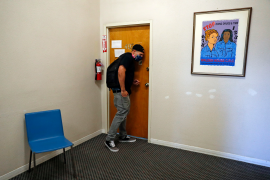By Kerry Young, CQ Roll Call
August 31, 2015 -- A plan to require a medical signoff before moving nursing home residents to hospitals for routine care has been heavily criticized, making it one of the most controversial items in a proposed sweeping overhaul of federal rules for long-term care organizations.
The Centers for Medicare and Medicaid Services (CMS) intends to mandate an in-person visit by doctors or other specified staff before people residing in nursing homes and similar centers are sent to hospitals, with emergency cases to be exempted from the requirement. Critics say medical evaluations would be costly and impractical.
Many executives and staff workers from nursing homes argue that they will not be able to find doctors and other qualified medical personnel to carry out the requirement due to staffing shortages. They also noted that the required review could prevent staff at nursing homes from honoring the wishes of residents and their families regarding hospital transfers. Veronnica Smith, executive director of a skilled-nursing facility in rural South Dakota, said the CMS plan was not realistic in her region.
"We do not have the luxury of a physician in our community 24/7, let alone physicians that would be willing to come to the facility to assess a resident before a transfer," Smith wrote. "Further, in the event of an emergent need, the time it would take a physician to get to the facility to approve the transfer would be too late."
Stephen Hamlin, a New York-based nursing home administrator, called the proposal "impracticable and likely counterproductive."
"I do not believe that it is appropriate for a resident experiencing an acute episode to have to wait for the arrival of a physician or physician extender before receiving emergency hospital care nor it is reasonable to expect a caregiver to determine whether a resident is at risk or not," he told CMS in a comment.
CMS is accepting public feedback on the long-term care regulation through Sept. 14. CMS has received dozens of comments addressing the mandate, with more than 30 of them referring specifically to the section of a proposed long-term care rule that would create the requirement. Dozens of other people raised objections without citing the provision specifically.
Unveiled in July, CMS' long-term care proposal marks the first attempt at a comprehensive update of the regulations since 1991, the agency said. Many organizations already have said that the expenses for carrying out the new regulations for long-term care would be burdensome. By CMS' estimate, the national cost for implementation of the proposal could be $729 million in the first year, or about $46,491 for each site providing long-term or specialized nursing care. In the second year, the estimated cost would drop to about $40,685.
CMS has worked for some time to prevent unnecessary transfers of residents of nursing homes, which can be "expensive, disruptive, and disorienting for seniors and people with disabilities," the agency says on its website. People transferred from nursing homes may be especially vulnerable to risks of hospital stays, including errors with medication and infections.
Current rules already require doctors to document the cause for a transfer when a nursing home or other long-term care center can't meet a person's needs, CMS said in the proposal. Requiring an evaluation by a doctor, physicians assistant, nurse practitioner, or nursing specialist before such a transfer may prevent some unneeded moves from occurring and give information to hospitals in cases when patients are moved, according to the agency.
"The idea is that this would be an opportunity to identify options that would allow the resident to be treated in house, if appropriate," said Sheila Blackstock, a CMS official who is helping create the new regulation, on an Aug. 11 call with nursing home officials. "There is an emergency exemption, and it is intended to prevent this provision from delaying a necessary transfer or putting the resident at increased risk."


